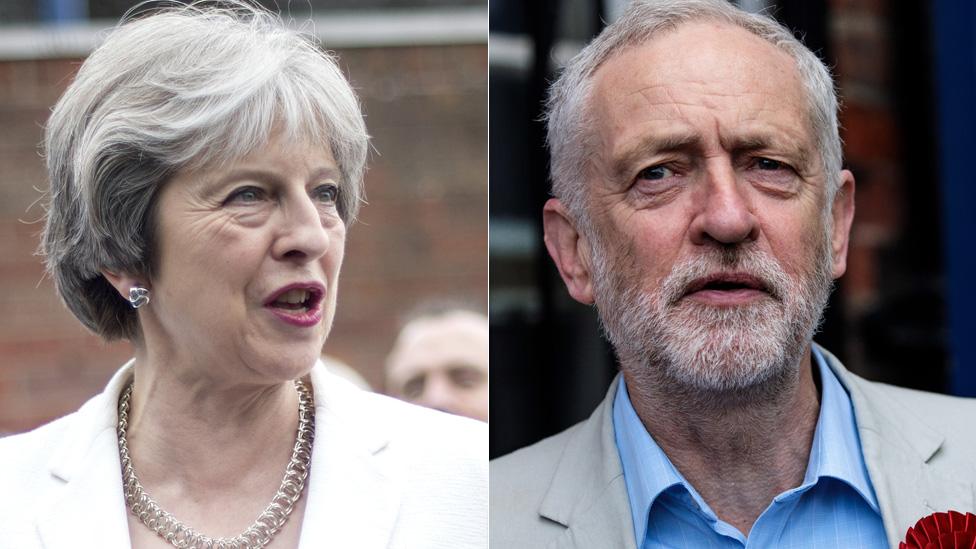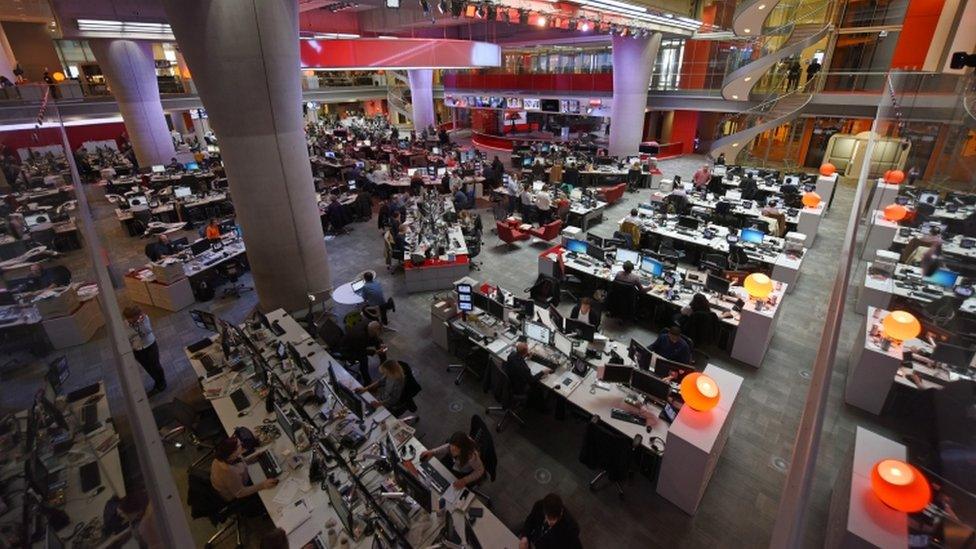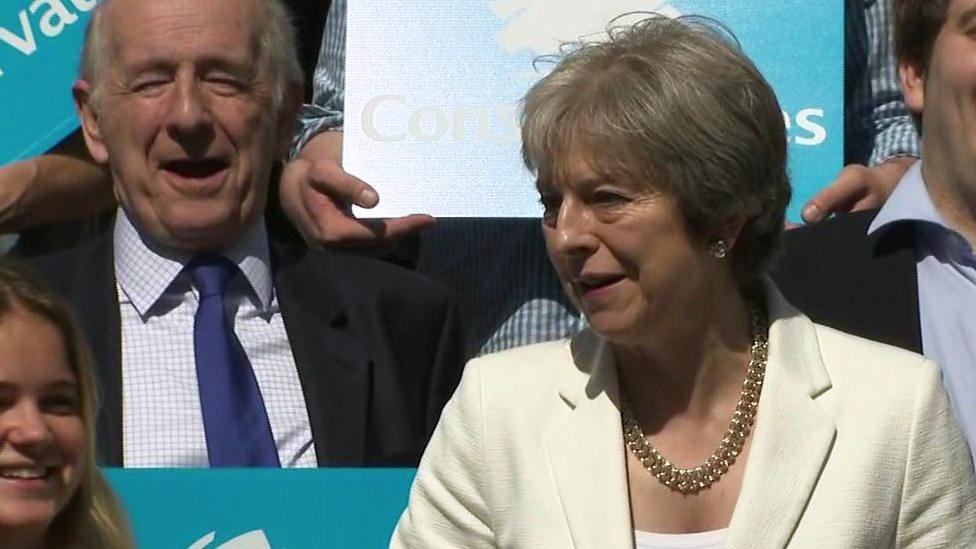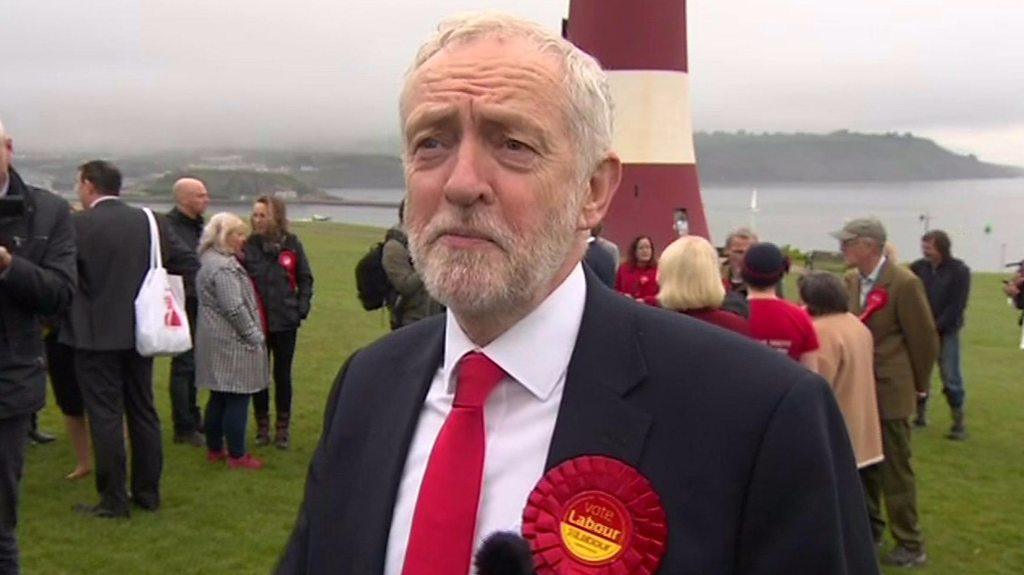Local election results 2018: No clear winner as Labour and Tories neck and neck
- Published

No clear party winner has emerged following Thursday's local elections in England.
As the final election result was declared in the London borough of Tower Hamlets overnight, Labour sealed their best result in the capital since 1971.
But their failure to secure key targets such as Wandsworth saw Theresa May claiming "success" for the Tories.
"We have to do better if we're going to be in government," said Lady Smith, Labour's leader in the House of Lords.
"Not much went wrong, but not as much went as well as we'd have liked," she told BBC's Newsnight.
Analysis suggested the two main parties were neck and neck overall in terms of national vote share - on 35% each. Last year Labour's vote share was estimated to be narrowly ahead of the Tories.
Labour leader Jeremy Corbyn said he was "disappointed at any places where we lost a bit of ground".
However, he insisted it was a "solid set of results" which left the party "well placed to fight and win the next general election".
Jeremy Corbyn: "There's much more to come and it's going to get even better"
BBC political correspondent Chris Mason said neither Labour nor the Tories could claim a "substantial breakthrough".
"But while the overriding sentiment among Conservatives is one of relief, within Labour, it's introspection," our correspondent said.
The Conservatives are widely seen to have benefitted from the collapse of the UKIP vote - prompting leading Brexiters such as Boris Johnson and Iain Duncan Smith to urge the prime minister to press on with plans for a clean break with the EU.
According to the BBC's projected national vote share, the Conservative party is three points down on what it achieved in 2017's county council elections but, after eight years in government, it is better than its performance in any of the local elections held between 2012 and 2014 and in 2016.
Theresa May hails Tory campaigners in Wandsworth
The party saw a small swing in their favour outside the capital and clung on to key London boroughs including Westminster, Wandsworth and Kensington & Chelsea - despite Labour ambitions.
Mrs May praised Tory councillors after winning Basildon, Peterborough and Barnet.

At-a-glance
The final council to be declared was Tower Hamlets, which was gained by Labour from no overall control.
With all councils declared, Labour won 2,350 seats, up 77, the Conservatives won 1,332, down 33, the Lib Dems won 536, up 75, the Greens won 39, up eight and UKIP won three, down 123.
The Conservatives gained the London council of Barnet from no overall control, and held their flagship London councils of Westminster and Wandsworth. They also won Basildon and Peterborough, which had both also been under no overall control. But they have lost control of their northern flagship Trafford Council after 14 years of Conservative rule.
Labour had high hopes for the night, and have won Plymouth from the Tories and gained Kirklees from no overall control but lost Nuneaton and Bedworth and Derby.
The Lib Dems have gained four councils, winning neighbouring Kingston-upon-Thames and Richmond-upon-Thames in Greater London and South Cambridgeshire from the Tories and Three Rivers from no overall control.
The Greens have gained seats - taking some from Labour in Sheffield and from the Tories in Richmond upon Thames.
UKIP, which performed strongly last time most of the seats were fought in 2014, has seen its vote collapse. It had just three councillors elected, after losing 123.
Sinn Féin has won the Westminster by-election in West Tyrone.
Labour MP Dan Jarvis has been elected mayor of the Sheffield City Region.


But the Tory triumph in Barnet was largely attributed to Mr Corbyn's failure to deal with anti-Semitism within his party - and saw a further flurry of criticism from Labour MPs.
Deputy leader Tom Watson acknowledged the Jewish community had "sent us a message" and said the party had to learn lessons when it came to dealing with anti-Semitism in its own ranks.
Shadow justice secretary Richard Burgon denied that Mr Corbyn's response to Syria and the poisoning of the Russian spy in Salisbury were issues on the doorstep for traditional Labour voters.
In his experience of doorknocking in these elections, it was "very rare" for the public to raise Mr Corbyn's leadership in a negative way, he told BBC Radio 4's Today programme.
Backbencher Jess Phillips said the party had to look at what had gone wrong in white working class areas in northern England, while Chuka Umunna called for an internal inquiry into the party's campaign, to look at why expected gains hadn't materialised.
Mr Umunna said the government was "divided and incompetent" yet Labour had not seen "the big win in Wandsworth or Kensington that was expected".
Professor Sir John Curtice on three things we learnt from the local election results
Alastair Campbell, Tony Blair's former director of communications - and well-known critic of Mr Corbyn - said Labour should be destroying the Conservatives given the "disastrous Brexit negotiations" and "serial incompetence" in the government.
The results were bad, he told the Today programme. "You do not get into a winning position by being in denial," he added.
'Rome wasn't built in a day'
The election was seen as a bloodbath for UKIP, which lost dozens of councillors - and its own general secretary compared the party with the Black Death.
But the Liberal Democrats enjoyed success as it gained control of four extra councils, winning back Kingston-upon-Thames - which they lost to the Tories four years ago - as well as neighbouring Richmond.
The party also gained control of Three Rivers, south-west Hertfordshire, which had been under no overall control and has won South Cambridgeshire from the Tories.
Party leader Sir Vince Cable said was "the beginning of the comeback of the Lib Dems", but warned: "It's not going to happen overnight - Rome wasn't built in a day."
- Published3 May 2018

- Published4 May 2018

- Published4 May 2018
